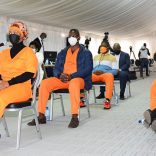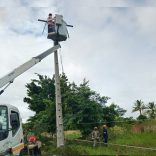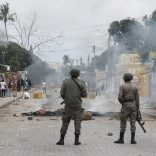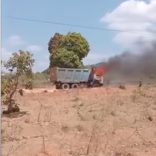Mozambique: District Permanent Secretary questioned for embezzlement - AIM | Watch
Mozambique: Insurgents have adopted guerrilla warfare and special forces are needed – expert

FILE - For illustration purposes only. [File photo: Lusa]
Mozambican security expert Rodrigues Lapucheque says that the armed groups operating in Cabo Delgado province have adopted guerrilla tactics, and that their eradication requires special forces adapted to this new reality.
The insurgents have “retreated and organised themselves in small groups to face the regular forces of the SADC plus Rwanda”, says Lapucheque, a university professor and colonel of Motorised Infantry in the Armed Forces of Defence of Mozambique (FADM). He holds a PhD in Law and Security from Universidade Nova de Lisboa.
The rebels, he continued, are now betting on typical guerrilla tactics: attrition of the adversary, ambushing soldiers and assaults on villages in search of food.
They were forced to abandon the conquest and occupation of territory and have instead opted for permanent flight and mobility, he explained.
Lapucheque points out that the adaptation of the armed groups to a new form of action resulted from the success of the government forces, especially after the July, 2021 arrival of military contingents from the Southern African Development Community (SADC) and Rwanda.
The transformation of the rebels has led to the extension of the initial terms of the SADC contingent’s mandate and announcements of the indefinite presence of the Rwandan contingent, he noted.
The armed groups’ ability to adapt, he continued, has to do with the guerrilla experience of international terrorists who joined the local cells of the armed rebellion in Cabo Delgado, mainly fighters from groups associated with Al-Shabab, the rebel Islamist movement fighting the government of Somalia and the international military forces that support it.
“These are not just any terrorists: they are radical Islamic terrorists from the radical organization Al-Shabab, who, in principle, have been operating from Somalia,” with some of the fighters leaving the country as a result of military pressure from government and international forces.
They have fled to Kenya, passed through Tanzania and entered Mozambique, where they found fertile ground for conflict as a result of the sociocultural similarities in the Islamic communities of the coastal region and the ease of recruiting new members among the poor and unemployed youth of Cabo Delgado, Lapucheque explains.
To contain the evolution of the insurgency in Cabo Delgado, the Mozambican government must invest heavily in the training (already underway), and equipping of special forces with capabilities designed to combat guerrillas, he added.
This force must be equipped with fast and modern means of mobility, whether land or air, and advanced telecommunications for better coordination of combat actions, supply, and the removal of wounded and casualties.
Rodrigues Lapucheque highlighted the importance of Mozambique developing its own ability to confront the “radical jihadists”, since the SADC and Rwandan forces cannot stay indefinitely, because of the high economic costs these missions entail.
The military officer noted that Rwandan forces had managed to expel the insurgents from their main bases in Cabo Delgado as a result of their combat experience in the East African sub-region, but SADC has also restored security in areas in northern Mozambique.
Concerning fears of lack of coordination between the forces on the ground in Cabo Delgado, Lapucheque says that in reality these risks have been avoided through greater communication between the military leadership and articulation on the ground.
Lapucheque warned that the vicissitudes of the war in Cabo Delgado make the temptation to set deadlines for the defeat of armed extremism in the province inadvisable.
Cabo Delgado province, in northern Mozambique, is rich in natural gas, but has been terrorized since 2017 by armed rebels, with some attacks claimed by the Islamic State extremist group.
According to the International Organisation for Migration (IOM), about 784,000 persons have been internally displaced by the conflict, which has killed about 4,000, according to the ACLED conflict registry project.
Since July 2021, an offensive by government troops, with the support of Rwandan and later Southern African Development Community (SADC) troops, has recovered a number of areas from rebel control, but their flight has led to new attacks in districts through which they have passed or taken up temporary refuge.













Leave a Reply
Be the First to Comment!
You must be logged in to post a comment.
You must be logged in to post a comment.